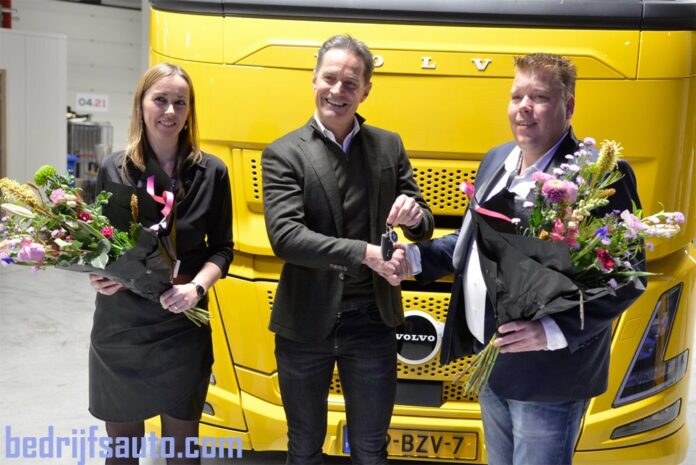Earning money in transport… with an electric fleet. That was the topic of the annual press conference of Volvo Trucks on Thursday 23 January, at logistics service provider Cargo Service Europe bv in Weert, the Netherlands. CSE (two warehouses, 100,000 m2, active in the beverage can / beverage can industry, storage capacity 1 billion beverage cans) has ten electric Volvo FHs and eight more on order.
Can you build a business case with electric trucks? The answer is yes, according to Anita Leeijen, CFO of CSE. But only in good cooperation with ambitious partners (truck dealer, importer, financier, governments, energy company), good planning, subsidies and a trial-and-error mentality.
In 2024, 17,793 new trucks were registered in the Netherlands. Only 533 of them were electric. Hard to believe that the end of fossil fuels is near. In 15 years, only zero-emission trucks will be rolling out of the Volvo Trucks factory. It’s time for action.
CSE, founded in 2010 by director-owner Martijn Vos, believes in making transport more sustainable. “More and more clients will demand environmental reports from their transport partners. The net CO2 emissions from transport will have to be reduced to zero.” CSE started with LHVs in 2015 (40% more pallets in a combination), in 2021 with LNG (now 75 Volvo FHs with bio-LNG on the road) and in 2023 with electric trucks. Latest achievement: an LHV combination with an electric tractor.
CFO Anita Leeijen (accountancy background) ensures that the figures are correct. Dealer BAS Trucks supplies a working e-truck, technical support and driver training. But there is more to it. CSE has roofs with solar panels, but not enough to charge all trucks. Regular contact is maintained with the grid operator regarding the purchase and return of kWh. Charging elsewhere requires preparation.
“A poorly chosen charging point can cost you an extra 150 euros for one battery charge.”
“A poorly chosen charging point can cost you an extra 150 euros for one battery charge. In any case, we can only drive electrically profitably if we use as much of our own power as possible. And if we plug in when loading and unloading. The time factor is extremely important.”
What else did CSE encounter? Subsidies for electric trucks in the Netherlands are distributed by lottery – so you cannot base a financial calculation on that. Charging takes twice as long in the winter as in the summer. The MIA (tax benefit for environmentally friendly investment) no longer exists. Electric trucks will soon pay Maut on German motorways. There is often no room for extra long combinations at charging stations. The electric trucks are “connected” but the dashboard for fleet owners is still under development.
There are also positives. E-trucks are becoming increasingly cheaper. They require less frequent maintenance. The range is improving slightly every year. A subsidy scheme for charging plazas is being introduced. The truck dealer offers support beyond expectations. The Dutch government (Ministry of Economic Affairs) proves to be a good sparring partner.
Volvo Trucks is proud of customer CSE, its ambitions to electrify and the pioneering mentality shown. The truck manufacturer expects that the sale of e-trucks will accelerate from this year because obstacles will disappear and driving e-trucks will become cheaper. An important factor in this: the truck levy that will start in the Netherlands in mid-2026. Trucks will pay per kilometer and the levy for diesel trucks will be 4 to 5 times higher than that for electric trucks. In the end, driving with electric will then be cheaper than with diesel. At BAS Trucks, the share of e-trucks in the order portfolio has now risen to 15%.





